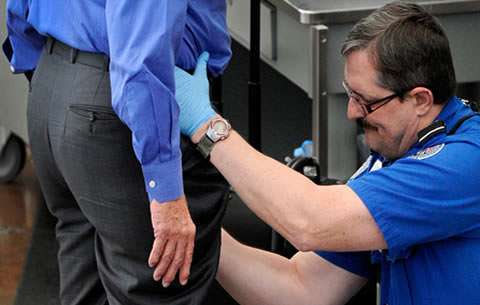No-Fly List Defenders Have a New Excuse: ISIS

It used to be that if you were on the no-fly list, you stayed on the no-fly list. But earlier this year, a judge deemed the government's secretive process for placing individuals on the list unconstitutional and demanded reform. Today, officials from the Transporation Security Administration (TSA), the FBI, and the Government Accountability Office (GAO) assured lawmakers of the House Subcommittee on Transportation Security that areas for reform have been identified and that everyone involved is sufficiently balancing civil liberties with national security.
Sadly, the proceedings did not excite much confidence in these assurances. Some legislators at the hearing stressed that the danger posed by ISIS requires better intelligence and a better no-fly list. It seems the ISIS situation will ensure that the concerns of civil libertarians will once again be put on the backburner here.
Regarding the TSA Secure Flight program, which matches passengers to the government's Terrorist Watch List, Jennifer Grover of the GAO put forward a rather lackluster proposal, recommending a faster appeals process for people wrongly placed on the list.
Christopher Piehota, director of the FBI's Terrorist Screening Center, intoned that the screening process is rigorous. But the current criteria for inclusion on the list still seem entirely too vague: "if an individual is known, suspected to be, or has been in preparation for, in aid of, or related to, terrorism or terrorist activity."
Only Rep. Mark Sanford (R-S.C.) forcefully addressed civil liberties concerns—justified concerns, considering a remarkable 98 percent of people who seek redress for being put on the no-fly list eventually get taken off the list because they've been placed there erroneously. Forty percent of people on the list have no affiliation with a terrorist organization at all.
Sanford wanted to know why it was taking these people up to a year to disappear from the list. Stephen Sadler, the TSA's assistant administrator for intelligence & analysis, claimed that the agency "can do it within about two weeks," but when external agencies get involved, it can take up to 60 days.
"That's where the majority of those individuals of the 98 percent fall," said Sadler. But the GAO found that the average TSA response time is 276 days if you're in the other 2 percent. And getting taken off the list doesn't mean getting out of the TSA watch system. In true Kafkaesque fashion, you are instead transferred to a "cleared list."
Sandler justified the procedure: "It's our way of ensuring you go through the checkpoint without any inconvenience." Presumably because you've been flagged before. Now you're flagged again—but differently.
When Sanford worriedly pointed out that it seems like all Americans are on some sort of list according to their potential terrorist threat, Sadler blithely agreed that this is indeed the case.
Editor's Note: As of February 29, 2024, commenting privileges on reason.com posts are limited to Reason Plus subscribers. Past commenters are grandfathered in for a temporary period. Subscribe here to preserve your ability to comment. Your Reason Plus subscription also gives you an ad-free version of reason.com, along with full access to the digital edition and archives of Reason magazine. We request that comments be civil and on-topic. We do not moderate or assume any responsibility for comments, which are owned by the readers who post them. Comments do not represent the views of reason.com or Reason Foundation. We reserve the right to delete any comment and ban commenters for any reason at any time. Comments may only be edited within 5 minutes of posting. Report abuses.
Please to post comments


Thanks to ISIS, we are entering a zone of danger .
Is that pre or post Burt Reynolds?
RAMPAGE!
I think I'd prefer being compelled to play games of homoerotic volleyball in the airport instead of the current TSA security theater.
Po-TAY-to, Po-TAH-to...
You can be my wingman anytime.
ISIS doesn't deserve a redress of grievances!
"if an individual is known, suspected to be, or has been in preparation for, in aid of, or related to, terrorism or terrorist activity."
"Suspected to be related to terrorist activity"? I suppose any specific examples of that are classified.
All allegations shall be taken seriously, no matter how vague.
Congressman Peter King?
If everything is a priority, nothing is a priority.
Even with the 'Brazil' level of absurdity exposed by the court case mentioned these lists are still defended, while at the same time defenders will just shrug there shoulders and blithely agree that maybe there are some issues.
If Americans can fly wherever and whenever they want, the terrorists have won.
Good for Mark Sanford. Not surprising, he's long been pretty good on libertarian issues (and even good at vetoing good ole boy Republican spending and things in SC).
They've got to protect their phoney baloney jobs!
I've been rewatching Star Trek DS9 and am noticing just how Cardassian-like some of this is.
One of the episodes has some of the cast Quantum Leaped into a group of Bajorans in the past suspected of attempted murder or something. The cop/security chief says that they have ties to the Bajoran resistance; Odo then points out that after 50 years, everyone has ties to someone in the resistance (or maybe the resistance itself, I forget).
I can't help but think that another 20 years of this sort of clumsy, lazy matching, we will all have direct ties to someone on the list, thus necessitating/justifying our inclusion on the list as well.